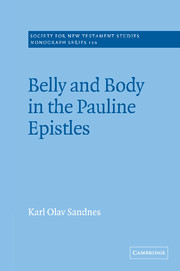Book contents
- Frontmatter
- Contents
- Preface
- Abbreviations
- Part 1 Prolegomena
- Part 2 The Graeco-Roman belly
- Part 3 The appropriated belly
- Part 4 Belly-worship and body according to Paul
- Part 5 The earliest expositors of Paul
- Part 6 Conclusions
- Bibliography
- Index of modern authors
- Index of Graeco-Roman sources
- Index of Old Testament, Apocrypha, Pseudepigrapha and other Jewish writings
- Index of New Testament and early Christian writings
Part 2 - The Graeco-Roman belly
Published online by Cambridge University Press: 22 September 2009
- Frontmatter
- Contents
- Preface
- Abbreviations
- Part 1 Prolegomena
- Part 2 The Graeco-Roman belly
- Part 3 The appropriated belly
- Part 4 Belly-worship and body according to Paul
- Part 5 The earliest expositors of Paul
- Part 6 Conclusions
- Bibliography
- Index of modern authors
- Index of Graeco-Roman sources
- Index of Old Testament, Apocrypha, Pseudepigrapha and other Jewish writings
- Index of New Testament and early Christian writings
Summary
It has already been claimed that to ‘have the belly as god’, or to be ‘enslaved to the stomach’ et cetera are commonplaces of ancient literature. This implies that Paul's readers are likely to have recognized his dicta in Phil. 3:19 and Rom. 16:18, as well as some other texts, as familiar. It remains to substantiate this claim, and to see how this topos was used. From the very outset we should expect various nuances to appear in the material. Parts 2 and 3 will thus lay bare the contemporary reader competence available, and hence also the competence of Paul's readers. The material presented in the following chapters enables us to read the Pauline texts with a new awareness, and thus in Part 4 to see more clearly how the Pauline belly-dicta are embedded in his rhetorical strategy in their immediate context as well as in his body-theology.
In many texts, of course, the stomach refers in a strict physical sense to the need for nutrition. It has a quite physical meaning, one fills the stomach in order to maintain life. The concern of Part 2 is texts where this vital necessity appears in a negative light, as a codeword for a lifestyle and an attitude to be criticised. The aim is to provide a sufficient basis for the study to continue into the Pauline texts, but in order to prove the existence of a topos about the belly, it is necessary to cover a wide range of material.
- Type
- Chapter
- Information
- Publisher: Cambridge University PressPrint publication year: 2002



